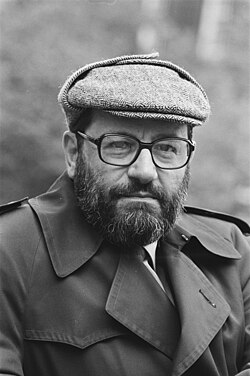Umberto Eco Quote
I'd be willing to bet that the notion of the end of time is more common today in the secular world than in the Christian. The Christian world makes it the object of meditation, but acts as if it may be projected into a dimension not measured by calendars. The secular world pretends to ignore the end of time, but is fundamentally obsessed by it. This is not a paradox, but a repetition of what transpired in the first thousand years of history.... I will remind readers that the idea of the end of time comes out of one of the most ambiguous passages of John's text, chapter 20...This approach, which isn't only Augustine's but also the Church Fathers' as a whole, casts History as a journey forward—a notion alien to the pagan world. Even Hegel and Marx are indebted to this fundamental idea, which Pierre Teilhard de Chardin pursued.Christianity invented History, and it is in fact a modern incarnation of the Antichrist that denounces History as a disease. It's possible that secular historicism has understood history as infinitely perfectible—so that tomorrow we improve upon today, always and without reservation... But the entire secular world is not of the ideological view that through history we understand how to look at the regression and folly of history itself. There is, nonetheless, an originally Christian view of history whenever the signpost of Hope on this road is followed. The simple knowledge of how to judge history and its horrors is fundamentally Christian, whether the speaker is Emmanuel Mounier on tragic optimism or Gramsci on pessimism of reason and optimism of will.
I'd be willing to bet that the notion of the end of time is more common today in the secular world than in the Christian. The Christian world makes it the object of meditation, but acts as if it may be projected into a dimension not measured by calendars. The secular world pretends to ignore the end of time, but is fundamentally obsessed by it. This is not a paradox, but a repetition of what transpired in the first thousand years of history.... I will remind readers that the idea of the end of time comes out of one of the most ambiguous passages of John's text, chapter 20...This approach, which isn't only Augustine's but also the Church Fathers' as a whole, casts History as a journey forward—a notion alien to the pagan world. Even Hegel and Marx are indebted to this fundamental idea, which Pierre Teilhard de Chardin pursued.Christianity invented History, and it is in fact a modern incarnation of the Antichrist that denounces History as a disease. It's possible that secular historicism has understood history as infinitely perfectible—so that tomorrow we improve upon today, always and without reservation... But the entire secular world is not of the ideological view that through history we understand how to look at the regression and folly of history itself. There is, nonetheless, an originally Christian view of history whenever the signpost of Hope on this road is followed. The simple knowledge of how to judge history and its horrors is fundamentally Christian, whether the speaker is Emmanuel Mounier on tragic optimism or Gramsci on pessimism of reason and optimism of will.
Related Quotes
About Umberto Eco
Eco wrote prolifically throughout his life, with his output including children's books, translations from French and English, in addition to a twice-monthly newspaper column "La Bustina di Minerva" (Minerva's Matchbook) in the magazine L'Espresso beginning in 1985, with his last column (a critical appraisal of the Romantic paintings of Francesco Hayez) appearing 27 January 2016. At the time of his death, he was an Emeritus professor at the University of Bologna, where he taught for much of his life. In the 21st century, he has continued to gain recognition for his 1995 essay "Ur-Fascism", where Eco lists fourteen general properties he believes comprise fascist ideologies.
